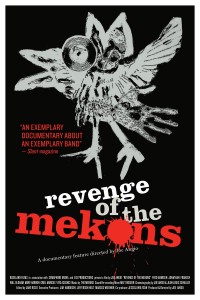Originally an obscure punk band from Leeds, known for borrowing Gang of Four’s equipment and a hellbent lack of musicality, The Mekons resurfaced in the mid-’80s with several new members and entirely new music. Fatalistic and shorn of hope, their new songs drew from deep sources in American country music as they sang about the wreckage of Great Britain in the that era. Two women – a thrilling singer named Sally Timms and fiddle player Susie Honeyman – lifted their sound into the high lonesome. Their comeback album Fear & Whiskey deserved Dylan’s old line – “thin wild mercury music” – country rock that was never Country Rock. Over the years, through one major label fiasco and albums ranging from okay to wonderful, The Mekons perservered, outlasting Margaret Thatcher by over 20 years. Their knack for finding the unities linking old country music’s sense of peril with populist politics, their penchant for laughing at fate, won them a madly-devoted if never large coterie of fans. They once recorded an anthem called “The Curse of the Mekons.” The band’s total career income wouldn’t amount to a minor rounding error in a Rolling Stones tour ledger, yet they made history. Everywhere they go they are among friends.
That the Mekons overlap with the latter behemoth — in the person of Dick Taylor, once a neolithic Stone (and founder of The Pretty Things), briefly a Mekon– is only one of the odd facts that surfaces in Revenge Of The Mekons, a terrific 2013 documentary just out on DVD. Director Joe Angio deploys the usual array of interviews, peformances and behind-the-scenes footage to unusually vibrant effect, caroming through time and space with an eye for the lively. The plain, linear story of the band is here, yet the movie feels like a series of inquiries and odd turnings. It’s a mystery story, investigating how on earth this band endured, and a study of friendship that doesn’t quite tip its hand until the last scene. More explicitly, Angio and the various Mekons consider the question of how musicians can survive on the margins of a pitiless, criminal and ridiculous industry without a) turning themselves into commodities, and b) getting ground into little pieces. Part of the answer lies in a deep conviction, implied but never voiced, that it is not enough to clutch the skull in your pocket; choosing darkness can end up as one more craven career move. You must keep a joke in your heart. “Jesus walking in the garden,” they sing in “100% Song,” “We’d like to thank him for this song/We’d like to thank him for these beers/We’d like to thank him for our careers.” Infectious joy prevails at a Mekons show. Lead singer and guitarist Jon Langford can barely suppress his exuberance, cracking himself up and usually the audience too. All the bitter songs about death and sorrow somehow end up as hymns to joy. How many bands can do that, and how many rock-docs get it to the screen? Somehow this one does.







No Comments so far
Jump into a conversationNo Comments Yet!
You can be the one to start a conversation.